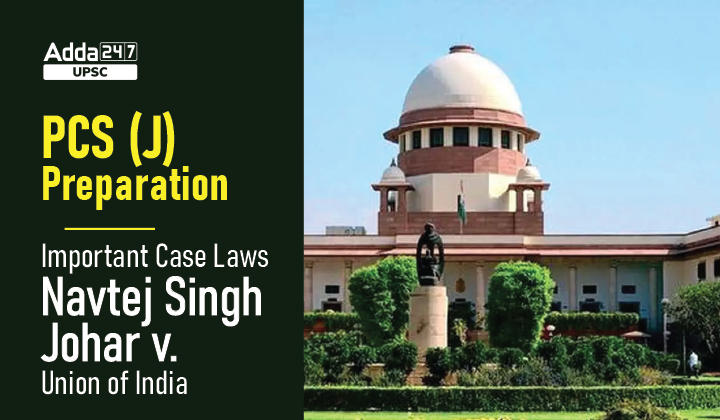Table of Contents
Navtej Singh Johar v. Union of India
Facts of the Case
In 2009 in NAZ foundation v. N.C.T of Delhi – Delhi High court declared Section 377 of IPC as unconstitutional which was challenged in 2014 In Suresh Kumar Kaushal v. NAZ foundation in Indian Supreme Court (SC) which was overturned by a two Judge bench. The SC judgment was again challenged in 2016 in Navtej Singh Johar v. UOI and was presided over by a five Judge bench of SC. In this case the petitioner, Navtej Singh Johar was a dancer who belonged to LGBTQ community who filed a writ petition in SC under Article 32.
तथ्य: 2009 में NAZ फाउंडेशन बनाम दिल्ली के N.C.T में – दिल्ली उच्च न्यायालय ने IPC की धारा 377 को असंवैधानिक घोषित किया जिसे 2014 में सुरेश कुमार कौशल बनाम NAZ फाउंडेशन में भारतीय सर्वोच्च न्यायालय (SC) में चुनौती दी गई थी। दो जजों की बेंच ने पलट दिया था। 2016 में नवतेज सिंह जौहर बनाम यूओआई में सुप्रीम कोर्ट के फैसले को फिर से चुनौती दी गई और इसकी अध्यक्षता सुप्रीम कोर्ट की पांच जजों की बेंच ने की। इस मामले में याचिकाकर्ता नवतेज सिंह जौहर एक डांसर थे, जो एलजीबीटीक्यू समुदाय से थे, जिन्होंने अनुच्छेद 32 के तहत सुप्रीम कोर्ट में एक रिट याचिका दायर की थी।
Issue in the Case
Constitutional validity of Section 377 of IPC and its application in consensual sexual conduct of adults of the same sex in private and whether it is violative of right of equal protection by law under Article 14?
मुद्दा: आईपीसी की धारा 377 की संवैधानिक वैधता और निजी तौर पर समान लिंग के वयस्कों के सहमति से यौन आचरण में इसका आवेदन और क्या यह अनुच्छेद 14 के तहत कानून द्वारा समान सुरक्षा के अधिकार का उल्लंघन है?
Laws Related to the Case
Indian Constitution
Article 14= Right to equality before the law.
Article 21 = Right to life.
Article 15= Right to protection from discrimination on the ground of sex.
Article 19= Freedom of Expression.
Article 25= Freedom of conscience and religion.
भारतीय संविधान
अनुच्छेद 14 = कानून के समक्ष समानता का अधिकार।
अनुच्छेद 21 = जीने का अधिकार।
अनुच्छेद 15 = लिंग के आधार पर भेदभाव से सुरक्षा का अधिकार।
अनुच्छेद 19 = अभिव्यक्ति की स्वतंत्रता।
अनुच्छेद 25 = अंतःकरण और धर्म की स्वतंत्रता।
Indian Penal code
Section 377
भारतीय दंड संहिता
धारा 377
Analysis: Section 377 of IPC was found to be violative of Article 21, 14, 15, 19 and 25 of Indian constitution by relying on principle of Transformative Constitutionalism and Progressive realization of rights.
विश्लेषण: परिवर्तनकारी संविधानवाद और अधिकारों की प्रगतिशील प्राप्ति के सिद्धांत पर भरोसा करके भारतीय संविधान के अनुच्छेद 21, 14, 15, 19 और 25 का उल्लंघन करने वाली IPC की धारा 377 को पाया गया।
Navtej Singh Johar v. Union of India – Judgement
Section 377 was declared Unconstitutional by a bench of then acting Chief justice Dipak Mishra, J. Khanwilkar, J. Nariman, J. Chandrachud and J. Malhotra. Five-judge Bench of the Supreme Court unanimously decriminalized Section 377 of the Indian Penal Code, to the extent that it criminalized same-sex relations between consenting adults. The LGBT community has a choice of choosing the same sex partner legally. The above segment of Section 377 was held to be unconstitutional and violative of Article 14 and Article 15 -right to equality in law and right to equality on the ground of sex.
फैसला: तत्कालीन कार्यवाहक मुख्य न्यायाधीश दीपक मिश्रा, जे. खानविलकर, जे. नरीमन, जे. चंद्रचूड़ और जे. मल्होत्रा की पीठ द्वारा धारा 377 को असंवैधानिक घोषित किया गया था। सुप्रीम कोर्ट की पांच-न्यायाधीशों की खंडपीठ ने सर्वसम्मति से भारतीय दंड संहिता की धारा 377 को इस हद तक अपराध से मुक्त कर दिया कि यह सहमति देने वाले वयस्कों के बीच समान-सेक्स संबंधों का अपराधीकरण करता है। एलजीबीटी समुदाय के पास कानूनी तौर पर समान सेक्स पार्टनर चुनने का विकल्प है। धारा 377 के उपरोक्त खंड को असंवैधानिक और अनुच्छेद 14 और अनुच्छेद 15 का उल्लंघन माना गया – कानून में समानता का अधिकार और लिंग के आधार पर समानता का अधिकार।



 TSPSC Group 1 Question Paper 2024, Downl...
TSPSC Group 1 Question Paper 2024, Downl...
 TSPSC Group 1 Answer key 2024 Out, Downl...
TSPSC Group 1 Answer key 2024 Out, Downl...
 UPSC Prelims 2024 Question Paper, Downlo...
UPSC Prelims 2024 Question Paper, Downlo...




